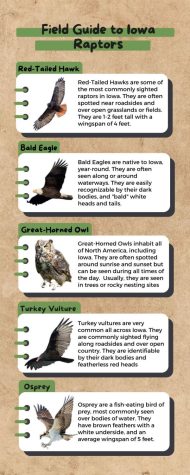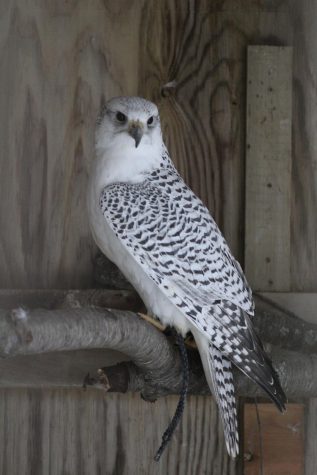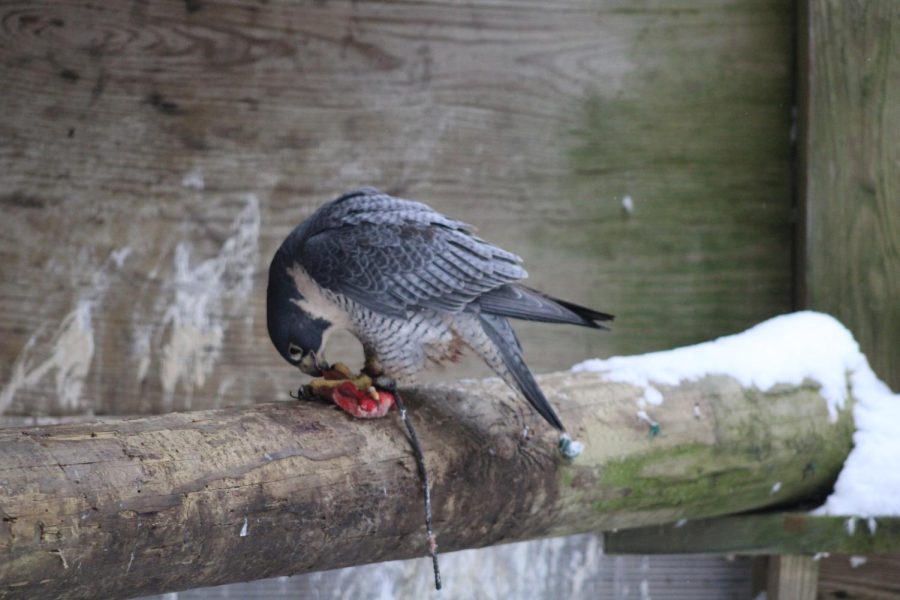The Iowa Raptor Project
The Iowa Raptor Project is working to educate on the importance of conserving Iowa’s native wildlife.
Tigerhawk, a male Peregrine Falcon, eats a meal in his enclosure.
Located in Solon, Iowa, the Iowa Raptor Project (IRP) currently houses 16 unreleasable birds of prey. The IRP features different species of owls, hawks, falcons, and eagles. These birds are on display to the public and are cared for by dedicated staff members and volunteers. The goal of the IRP is to preserve Iowa’s raptor populations and habitats through education programs in the community.
“Our main objective is to help introduce people to Birds of Prey in Iowa and [to educate people on] how they can help conserve [Iowa’s raptors] through education programs and volunteer opportunities,” says Holly Anthony, the IRP’s assistant director.
Raptors, or birds of prey, are classified as hyper-carnivorous birds that feed on other vertebrates. These birds are highly specialized for hunting and eating meat, with hooked beaks, strong talons, and keen eyesight. Raptors are vital to Iowa’s ecosystems. They act as pest control, helping to control population sizes of mice, rats, and insects, which reduces damage to crops. They also serve as indicators of ecological health. Because raptors are on the top of the food chain, they are the most dramatically affected by climate change and habitat loss.

“If raptors weren’t here, there would be a lot more sparrows, starlings, rodents, voles, etc.
that could cause an imbalance in Iowa’s wild spaces and farmland, too. A Red-Tailed Hawk can catch up to five or six rats or mice [in] a day. [Those are mice] that could be eating a farmer’s corn or wheat,” says Anthony.
Conservation is important, not only for Iowa’s raptors but ecosystems as a whole.
“It’s important for the entire food chain and [for] preserving Iowa’s wild spaces in general to conserve birds of prey. The wild spaces we have left are essential to maintain, not just for raptors, but for all wild animals,” stated Anthony.
The IRP does many programs within the Iowa City area to educate the public on the importance of conservation. Beginning in 2021, the IRP has been working with the University of Iowa Athletics to bring the IRP’s Raptor Ambassadors to the university’s athletic events. These specially trained Raptor Ambassadors, featuring Red-Tailed Hawks, Harris Hawks, and Peregrine Falcons, fly over the crowd at Iowa football, wrestling, and basketball games, and are meant to raise awareness for the IRP and the importance of conservation.
The IRP has many goals to help improve its current facilities and to grow its education efforts in the future.
“Some of our future goals are to get new signs and new enclosures for our birds. We also want to do regular free flight raptor education program and grow the IRP into a place that people think of when they think of [the] Iowa City area. We want to be the front of raptor conservation and education for all of Iowa in a variety of ways,” said Anthony.

There are many ways that members of the community can get involved with and support the IRP. The Raptor Center is open year-round for the public to see and learn about the birds on display. The IRP is also accepting donations that go towards feeding and caring for raptors, as well as funding updates to the project’s facilities. Those who wish to donate can visit this website.
People can also help support Iowa raptors and other wildlife by being more conscious of the environment in their actions.
“[You can help Iowa wildlife by] building nest boxes and setting them up in a good habitat, not using rat or mice poison, not throwing trash out your car window, [and by] not using lead bullets [when you hunt. These] are just some of the things that can help,” said Anthony.

Kaelyn is a junior and this is her second year on staff. At Liberty, she participates in softball, Garden Club, and NHS. Outside of school, she enjoys...









